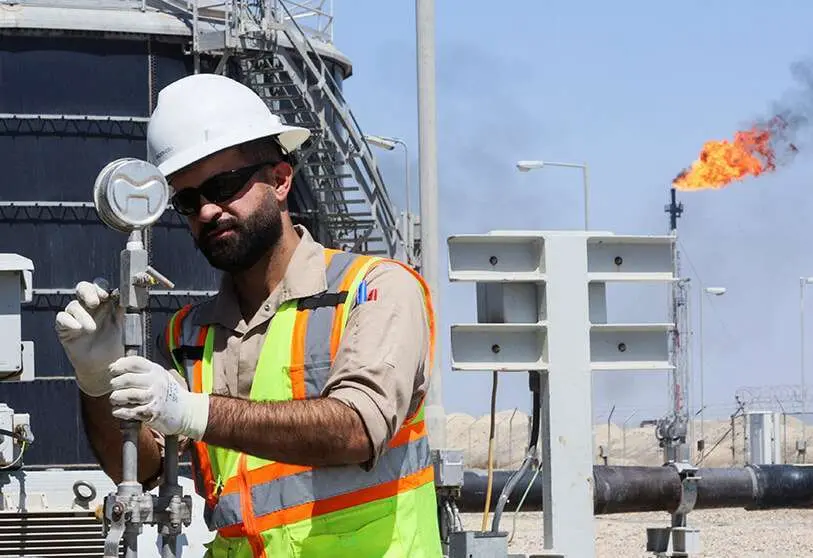Iraqi Kurdistan's oil industry targeted by pro-Iranian Shia militias

An oil refinery in Iraqi Kurdistan came under rocket attack, allegedly by pro-Iranian militias. On 1 May, up to six rockets hit a refinery in the capital and main city of the region, Erbil, causing a fire in one of its main tanks, according to local security forces.
The same refinery, run by the Kurdish-Iraqi oil company KAR Group, had suffered a similar attack on 6 April, with no group claiming responsibility for these actions.
The energy sector represents the main source of income in the region, in which KAR Group is one of the most important companies.

Masrour Barzani, the prime minister of the KRG, strongly condemned the attacks in a statement, calling on Iraqi Prime Minister Mustafa Al-Kadhimi to take all necessary measures against the "outlawed groups" responsible, without directly naming the perpetrator.
"These attacks cannot continue and a serious stance and action must be taken," the Kurdish politician concluded.
The origin of the attack is said to have come from the town of Bartella, near Mosul in Nineveh province, according to Lawk Ghafuri, a spokesman for the Kurdistan Regional Government. According to Al Monitor, the town is reportedly home to the Popular Mobilisation Forces (PMU), a coalition of mainly Shia (but also Sunni and ethnic Iraqi minority) militias allied with Iran.

The PMUs emerged in 2014 to fight the Islamic State, a bitter enemy of both Iran and Shia Islam, although many of them trace their roots back to 2003, following the fall of Saddam Hussein's regime and the subsequent rise of Iranian influence in the country.
The PMU has been formally part of the Iraqi Armed Forces since 2016, although since its inception it has been allied with Iran, its main external supporter, which has led to its rivals accusing it of being an Iranian fifth column in the country.
Despite this, they are not a unitary group, but a coalition of militias more or less close to Tehran, which sometimes also act with their own autonomy.

These episodes were preceded on 13 March by a ballistic missile attack on another KAR Group compound in Erbil claimed by the Islamic Revolutionary Guards Corps, the most important branch of the Iranian army, which protects its political regime. Tehran justified its attack by claiming to have hit an Israeli 'strategic centre of conspiracy', without providing further evidence.
BREAKING: Multiple videos show a ballistic-missile attack on the U.S. consulate in Erbil – within the Kurdistan region of Iraq.
— Clint Ehrlich (@ClintEhrlich) March 12, 2022
Here is the first video, showing the size of the blasts. ? pic.twitter.com/VBkHeWp4UT
For Kawa Hassan, Director of the Middle East and North Africa Programme at the Stimson Center, Tehran's open announcement of the 13 March attack implies an intention to send a clear message at the regional level, particularly to rivals such as Israel.
This, Hassan continues, might be compounded by a number of other factors behind Iran's rationale, such as pressuring the Kurdish authorities regarding government formation in Iraq or their plans to export natural gas.

Iraq is currently at a political impasse, following parliamentary elections in October 2021 that have generated an electoral metric that is unfavourable to the emergence of a new government.
The elections were won by the party of Shiite cleric Muqtada al-Sadr, who after the elections called for a "national majority government" and attacked the PMU, with which he has a complicated relationship, stating that "they must disband immediately and hand over their weapons to the government".
Al-Sadr sought to form a government with Barzani's Kurdistan Democratic Party (KDP) and the Sunni-leaning bloc led by Muhammad al-Halbousi.

This would exclude the pro-Iranian and pro-PMU parties, weakened after the elections, which denounced electoral fraud and blocked the possible investiture but have been unable to form an alternative government, leading the country into a six-month political deadlock.
Tehran and its Iraqi allies are reportedly trying to put pressure on the KDP and al-Halbousi to isolate al-Sadr and achieve a broader government, according to Iraqi politicians familiar with the negotiations told Middle East Eye, the context in which the attacks on Kurdistan are said to have taken place.
For Ali Fathollah-Nejad, an Iran expert at the American University of Beirut, "in case the attacks can be attributed to Iran-linked Shia militias in Iraq, they can be seen as demonstrations of their power of nuisance (or negative power), especially in light of their warnings to engage in violence in the event they are not included in any governing coalition."
Other reports also point to the Kurdish government's energy plans, whereby Erbil aims to strengthen its position as an exporter of natural gas. This was announced by Marzani at the Global Energy Forum, stating that '[Kurdistan] will become a net exporter of gas to the rest of Iraq, Turkey and Europe in the near future'. Erbil would thus be in direct competition with Tehran, which is also a major producer.

These statements came just weeks after the Kurdistan Regional Government signed an agreement with the KAR Group to build a gas pipeline to the Turkish border, opening the door to a European market that is highly demanding of new sources of natural gas to help reduce its dependence on Russia.
By attacking KAR Group facilities, Iran and its allies would be striking at the very heart of the Kurdish economy and its expansion plans.








